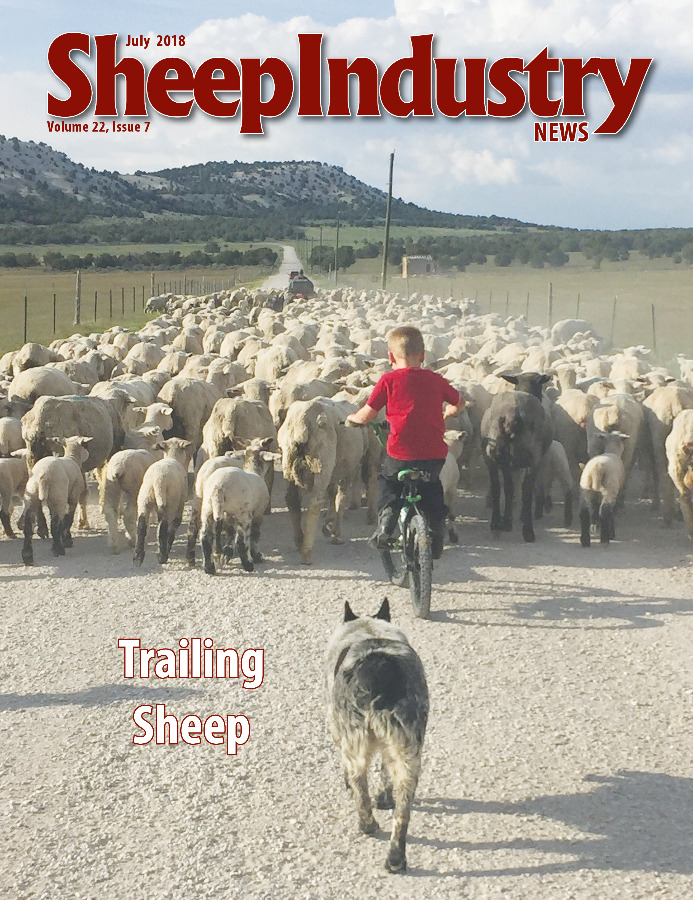
- July 2018
- President’s Notes
- Exports Drive Market for American Wool Producers
- Family Matriarch: Jeanne Siddoway
- IWTO’s 87th Congress Tackles Wool Sustainability
- NSIIC Budgets Funds for 2018 Grant Proposals
- Young Entrepreneur: Brady Campbell
- ASI News
- Around the States
- Obituary: Ernest “Bud” Gutzman
- Market Report
- Genetic Scrapie Resistance in Goats
- The Last Word
To View the July 2018 Digital Issue — Click Here

With Wool Season Behind Us, Industry Focuses on Farm Bill
Mike Corn, ASI President
This past spring was a busy and exciting time in the wool business. As manager of a wool warehouse, there’s nothing better than reporting back to producers about the high prices paid for their fine wools. The wool market has definitely been on a record run in the past year.
But I’m happy to have put the spring selling season behind me so that I can once again concentrate on my duties as ASI president. The two worlds collided in late May as I was part of a group representing American wool producers at the International Wool Textile Organization’s 87th Congress in Hong Kong.
I was joined there by a group I began referring to as the “Young Guns,” which included Evan Helle of Duckworth, Monica Ebert (now with BKB South Africa, but a familiar face in the American sheep and wool industries), and three great young buyers from Anodyne in Molly Martin, Russell Adkins and Erin (Martin) Dorf. It was obvious not only to myself, but to everyone in attendance that the American wool industry has a bright future with young people like these leading the way. You can read more about the Congress on page 12 of this issue.
As we roll into summer, the Farm Bill takes top priority. Both the U.S. House and Senate have held discussions on their respective proposals in the past month. As a whole, I believe our industry should be thrilled with the proposals that have been put forward. These prospective bills are more sheep friendly than any agricultural package in decades. We will be working to lock in sheep programs between the two bills as they hopefully make it across the floor of the House and Senate in June/July.
I would urge you to reach out to your congressional delegation on behalf of the Farm Bill. This legislation needs to be passed and in place before the current Farm Bill expires at the end of September.
We continue to fight the battle of the bighorns – most recently in Utah where the state has proposed transplanting wild sheep into the Mineral Mountains. While ranchers traditionally support wildlife and hunting interests, the addition of wild sheep could be the beginning of the end for grazing of domestic sheep in the area. This shouldn’t be the case as recent research has shown that several species of wildlife can carry the pathogen identified as a major contributor to pneumonia-associated die-offs in wild sheep.
But western sheep producers know all too well where the blame will fall if the recently transplanted sheep begin to experience health problems. This is why it is so important to find alternative allotments for producers affected by bighorns.
We also continue to push for the U.S. Department of Agriculture’s Animal and Plant Health Inspection Service to return to offering free, plastic scrapie tags. Scrapie tags are necessary in our fight to become scrapie-free, but the metal tags provided by APHIS are a true safety concern for both the sheep and the shearers who work with them. Congress appropriated an additional $500,000 for small ruminants in the next fiscal year, and we believe those funds would be best used on plastic tags.
The ASI Executive Board has some legislative work of its own to do, and will meet in my hometown of Roswell, N.M., at the end of this month to take care of association business. This will include looking at the budget submitted by the ASI Wool Council in late June. The meeting will also provide the board with the opportunity to visit my ranch in the Land of Enchantment. I look forward to hosting the board.

